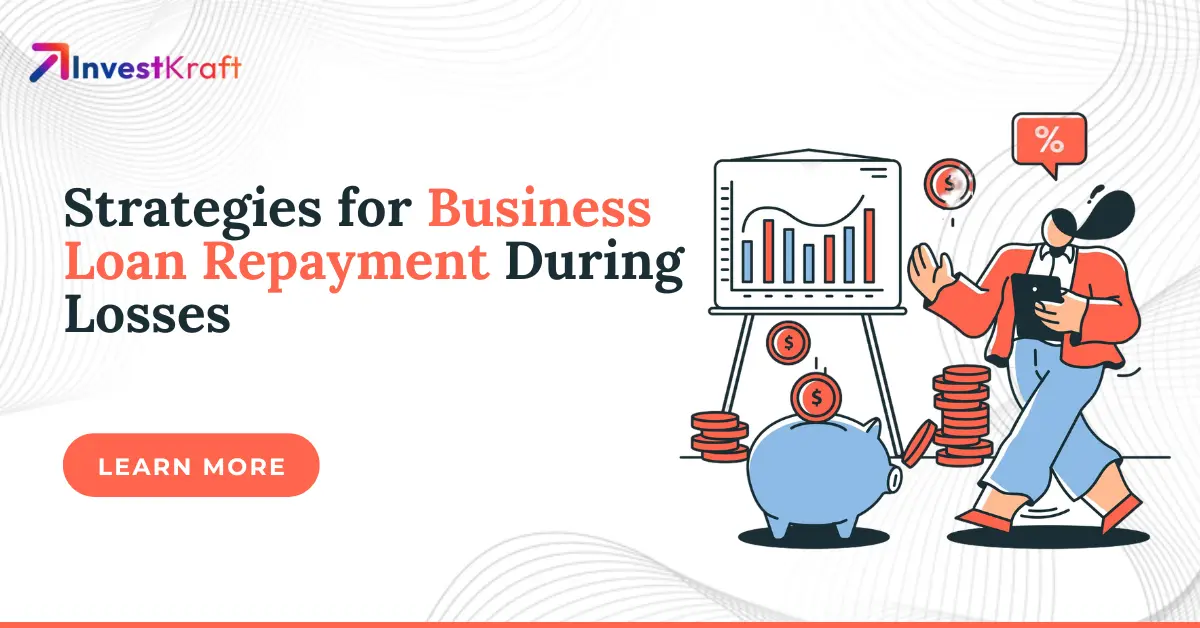Proven Strategies for Business Loan Repayment During Losses

Running a business demands significant effort, hard work and strategic planning to ensure success, especially during unforeseen circumstances. However, it is challenging to prepare for every unexpected event or situation, as recent times have demonstrated.
Many small-medium businesses have struggled to survive since the COVID-19 lockdown and its resultant financial strain. This forced business owners to make challenging decisions regarding managing their cash flow and prioritizing their business loan payments. The unprecedented situation has created a dilemma for SMEs, impacting their ability to sustain operations during this crisis.
What Do You Mean by a Business Loan Default?
Business loan default occurs when you fail to adhere to the repayment terms of your loan agreement. Unanticipated circumstances can hinder your ability to repay the loan on time and in full, leading to financial hardships. Failing to make the required instalments can negatively impact your business and credit history.
Understanding the Impact of Losses on Business Loan Repayment
Many borrowers find themselves unable to repay their business loans despite their best efforts. MSME businesses may face challenges such as poor sales cycles, customer payment delays or unexpected expenses, which can impact their ability to meet business loan payments.
Will there be consequences for not paying the business loan on time? Will the businesses have to pay a fine? Will such businesses get blacklisted from getting future business loans? What legal steps will the lender take? Let us avoid speculations and try and find out what will happen.
- Missed loan payments lead to lower credit scores, making it difficult to get future loans like personal loans and business loans.
- A low CIBIL score and bad credit history make it hard to get future loans, so you will need alternative funding. Also, charges keep on increasing.
- Default on a business loan can increase interest rates and result in a hefty late fee.
- Liquidation of assets can occur if you took a secured business loan or signed a personal guarantee for an unsecured loan. In both cases, your assets can be sold or seized for repayment.
- In unsecured business loans, lenders charge late fees and may sue if repayment is not received and the loan cannot be recovered by selling the assets.
- If you cannot repay an unsecured business loan, the lending company may take legal action. You must repay according to the court’s terms and conditions. If you still cannot repay, file for bankruptcy.
Further Reading: 8 Proven Loan Repayment Strategies for Financial Stability
What are the Effective Strategies to Repay a Business Loan During Losses?
To successfully repay a business loan during losses, it is essential to implement effective strategies that combine cost-cutting measures with revenue generation. These strategies include -
- Scrutinize Expenses: Review business expenses by identifying areas to reduce costs such as unused software, excessive office space, high-priced equipment etc. Consider cost-cutting alternatives or downsizing the workspace.
- Renegotiate Debts: Seek to renegotiate debts with suppliers/vendors for extended payment terms or discounts to improve cash flow.
- Reduce Inventory: Analyze inventory levels and optimize them. Holding excess inventory ties up capital that could be used for loan repayments. Implement just-in-time inventory management to minimize storage costs and ensure only necessary items are readily available.
- Become More Efficient: Consider implementing strategies to streamline operations and enhance efficiency, such as automating tasks, delegating tasks efficiently or outsourcing non-essential functions. By saving time, you can also save money in the process.
- Increase Sales: It is vital to prioritize and implement strategies that will effectively increase sales.
- Collect Outstanding Debts: Collect outstanding customer invoices to improve cash flow.
- Consider a Side Hustle: Explore side projects or consulting for extra income to help with loan repayments.
- Negotiate with Lender: Be open with your lender about the situation. A clear plan and commitment to repay can help in this scenario. Negotiate temporary loan modifications like payment extensions, lower interest rates etc.
- Prioritize Debt Repayment: Make repaying your debts a top priority in your budget to avoid damaging your credit score and incurring extra penalties.
- Seek Professional Help: Consult a financial advisor or business coach for expert guidance on managing finances and developing a turnaround strategy.
- Increase Profit Margins: Consider reviewing your pricing structure to identify products or services with high demand and relatively unaffected sales. Strategically raising prices on certain items and services could help improve profit margins.
- Consider Short-Term Financing: Explore short-term financing options such as a line of credit to bridge cash flow gaps and ensure timely loan repayments.
- Sell Underutilized Assets: Sell underutilized business assets to generate immediate cash for loan repayments.
- Crowdfunding: Use crowdfunding platforms to raise capital for innovative business ideas with a strong online presence.
- Employee Incentives: To motivate employees and drive revenue growth, implement performance-based incentives or profit-sharing programmes as employee incentives. This will encourage employees to contribute to the company’s turnaround and result in a stronger workforce.
- Reskilling and Upskilling: Investing in employee training programmes to enhance skills and capabilities is essential for improving productivity and creating new revenue opportunities. During challenging times, it is especially important to retain a skilled workforce.
Conclusion
Businesses are vulnerable to unforeseen circumstances that can disrupt cash flow and risk loan repayments. However, proactive and strategic planning can help businesses navigate financial challenges successfully. Implementing cost-cutting measures and revenue-boosting strategies can improve cash flow, along with open communication with lenders for flexible repayment options. Additional resources like short-term financing or asset sales can also help bridge temporary gaps in cash flow.
Investing in employee development is essential for unlocking new revenue streams and securing long-term success. By implementing training programmes and incentives, businesses can nurture a skilled and motivated workforce, leading to improved performance and innovation. This proactive approach can also create a positive work environment and foster loyalty among employees.
Frequently Asked Questions (FAQs)
Q: Should I stop repaying my business loan if I'm making losses?
A: It is not recommended to stop loan repayments as it can harm your credit score and make it harder to obtain future loans. Moreover, lenders may resort to legal measures to collect debt, which could result in seizing your assets.
Q: Are there any government programs or resources available to help during business losses?
A: Exploring government programmes and local initiatives designed to support businesses facing financial difficulties. Look into industry associations and small business development centres for additional resources and guidance.
Q: Can I negotiate a loan forbearance with my lender?
A: Consider discussing the possibility of a loan forbearance with your lender. This option allows for a temporary suspension of loan repayments, although interest may continue to accumulate. Keep in mind that while forbearance will not eliminate your debt, it can provide some temporary relief during difficult times.
Q: Should I consider filing for bankruptcy if my business cannot repay the loan?
A: Consult with a qualified bankruptcy attorney to explore all debt resolution options before considering bankruptcy, as it is a complex legal process with serious consequences. It should be seen as a last resort to fully understand its implications.
Q: Can I use additional business income to pay down the loan faster during a period of recovery?
A: It is important to prioritize using any additional income towards accelerated loan repayment as it reduces overall interest and frees up cash flow. However, it is crucial to maintain a healthy balance between aggressive repayment and retaining enough capital for ongoing business operations as well.
Q: Should I consider seeking additional funding to address losses and manage loan repayments?
A: Taking on additional debt to recover from temporary losses can be a potential solution, but it is important to think it through. Make sure you have a solid plan for using the funds wisely and generating enough revenue to repay your debts.
Q: Is there anything I can learn from this experience to prevent future financial difficulties?
A: Yes, analyzing the factors that caused your losses can lead to identifying areas for financial management improvement. This can involve implementing better budgeting techniques, diversifying revenue streams or increasing your emergency fund to be more prepared for future challenges.
Q: Are there any tax benefits associated with experiencing business losses?
A: Consult a tax advisor to understand how losses may be tax-deductible in your jurisdiction, potentially reducing your tax liability for the year. They can help you navigate the specific tax implications of your situation and guide you to maximize any potential benefits.

Author: Abhik Das
Abhik Das is a versatile content writer with over 5 years of experience crafting engaging and informative content across diverse industries. His expertise spans the fields of ed-tech, pharmaceuticals, organic food, travel, sports, and finance.
Here's what sets Abhik apart:
Content Versatility: Able to adapt writing style and tone to suit various audiences and content needs.
SEO Proficiency: Creates content optimized for search engines, ensuring discoverability and organic traffic.
Deep Research: Conducts thorough research to ensure content accuracy and credibility across complex topics.
Engaging Storytelling: Captures reader interest with clear, concise, and compelling writing.
Abhik's diverse background empowers him to deliver insightful content across a wide range of subjects. Whether you're seeking engaging explainer pieces on the latest financial trends, informative guides to organic food choices, or captivating travelogues, Abhik has the expertise to craft content that resonates with your audience.
















